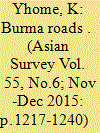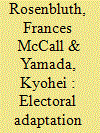| Srl | Item |
| 1 |
ID:
144658


|
|
|
|
|
| Summary/Abstract |
Even as economic benefits are emphasized in India’s connectivity efforts with its
neighbors, strategic interests also drive Delhi’s connectivity interests. How promptly
Delhi addresses the structural, security, and geostrategic factors that pose major
challenges to India’s regional connectivity goals will determine its future role in the
region.
|
|
|
|
|
|
|
|
|
|
|
|
|
|
|
|
| 2 |
ID:
144659


|
|
|
|
|
| Summary/Abstract |
Japan and South Korea have had differing patterns of responding to China’s rise and
aligning with the United States. This can be explained by shifting threat perceptions
based on interactions between evolving systemic and local threats, from both China
and North Korea, as well as their relative degrees of imminence.
|
|
|
|
|
|
|
|
|
|
|
|
|
|
|
|
| 3 |
ID:
143693


|
|
|
|
|
| Summary/Abstract |
Japan’s conservative Liberal Democratic Party swept both houses of parliament in December 2012 and July 2013 on a platform of Keynesian spending. Better known for fiscal stringency, the LDP “changed its spots” in part because 1994 electoral reforms force parties to compete on party platforms in place of clientelism.
|
|
|
|
|
|
|
|
|
|
|
|
|
|
|
|
| 4 |
ID:
143695


|
|
|
|
|
| Summary/Abstract |
Through a study of China’s wind turbine sector, this paper demonstrates how China liberally implements industrial policies and then removes them when the WTO disputes them. China’s convenient compliance with the WTO rulings reflects Beijing’s realpolitik navigation through the organization’s dispute-resolution process, rather than socialization to international norms.
|
|
|
|
|
|
|
|
|
|
|
|
|
|
|
|
| 5 |
ID:
143696


|
|
|
|
|
| Summary/Abstract |
This article explicates the East Asian concept of non-interference, looks at the merits and problems in interference in the region, and concludes by referring to statistical evidence that the practice of non-interference in East Asia has been crucial for the near-disappearance of battle deaths regionally since 1979.
|
|
|
|
|
|
|
|
|
|
|
|
|
|
|
|
| 6 |
ID:
144657


|
|
|
|
|
| Summary/Abstract |
The concept of neo-royalism—being sacred, popular, and democratic—has served
as a formula of success during King Bhumibol Adulyadej’s long reign. However, in
the twilight of the Bhumibol era and with the obviously less able Crown Prince
Vajiralongkorn waiting to succeed, this concept poses a potentially dangerous trap
for the monarchy and its entire network.
|
|
|
|
|
|
|
|
|
|
|
|
|
|
|
|
| 7 |
ID:
143697


|
|
|
|
|
| Summary/Abstract |
Given several possible strategic scenarios for East Asia, I argue that the region is likely to be divided by China’s growing power and the American presence along with its allies. The bipolar system in Asia will be relatively stable, however, because of conventional military balance, nuclear deterrence, and economic interdependence.
|
|
|
|
|
|
|
|
|
|
|
|
|
|
|
|
| 8 |
ID:
143694


|
|
|
|
|
| Summary/Abstract |
This article aims to deepen academic discussion of the Chinese Communist Party’s official media by presenting the neican/pishi (internal reference/written directive) model. The model represents an amalgamated system of internal watchdog journalism and political decision-making practices, reflecting the unique pattern of the CCP’s “documentary politics.”
|
|
|
|
|
|
|
|
|
|
|
|
|
|
|
|